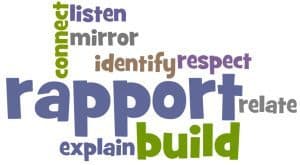 Building Rapport & Trust
Building Rapport & Trust
For many, starting a conversation with a stranger is a stressful event; we can be lost for words, awkward with our body language and mannerisms. Creating rapport at the beginning of a conversation with somebody new will often make the outcome of the conversation more positive. However stressful and/or nervous you may feel the first thing you need to do is to try to relax and remain calm, by decreasing the tension in the situation communication becomes easier and rapport grows.
 Helpful Rapport Building Behaviors
Helpful Rapport Building Behaviors
- If you are sitting then lean forward, towards the person you are talking to, with hands open and arms and legs uncrossed. This is open body language and will help you and the person you are talking to feel more relaxed.
- Look at the other person for approximately 60% of the time. Give plenty of eye-contact but be careful not to make them feel uncomfortable.
- When listening, nod and make encouraging sounds and gestures.
- Smile!
- Use the other person’s name early in the conversation. This is not only seen as polite but will also reinforce the name in your mind so you are less likely to forget it!
- Ask the other person open questions. Open questions require more than a yes or no answer.
- Use feedback to summarize, reflect and clarify back to the other person what you think they have said. This gives opportunity for any misunderstandings to be rectified quickly.
- Talk about things that refer back to what the other person has said. Find links between common experiences.
- Try to show empathy. Demonstrate that you can understand how the other person feels and can see things from their point of view.
- When in agreement with the other person, openly say so and say why.
- Build on the other person’s ideas.
- Be non-judgemental towards the other person. Let go of stereotypes and any preconceived ideas you may have about the person.
- If you have to disagree with the other person, give the reason first then say you disagree.
- Admit when you don’t know the answer or have made a mistake. Being honest is always the best tactic, acknowledging mistakes will help to build trust.
- Be genuine, with visual and verbal behaviors working together to maximize the impact of your communication.
- Offer a compliment, avoid criticism and be polite.
Check out the KnowledgeHUB for more articles to assist you in the field. If you have areas of training that you would like us to cover please send us an email, we would love to hear from you!


